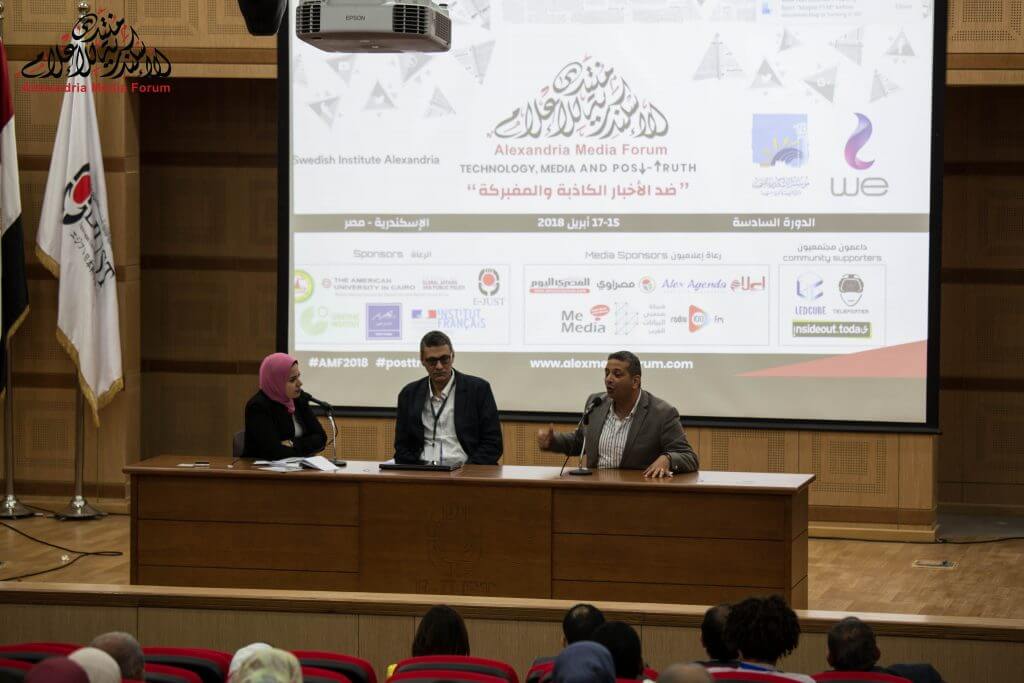“Technology, media and fake news in the post-truth era” was the title of the sixth edition of the annual Alexandria Media Forum, where we, as InsideOut and Wordlift, we’re proud to be the community supporters of this edition. As a key player in the digital media business in the Arab region & Middle East we supported the forum where Fady Ramzy was a keynote speaker at the opening panel and also Andrea Volpini provided a session about the power of Artificial Intelligence powered SEO in building a rock solid content strategy for the news & media industry.
The opening panel: online media opportunities and challenges
The opening panel, which included Fady Ramzy Insideout CEO and Ehab el Zellaky chief editor of Al-Masry el youm, discussed the opportunities and challenges in the online news & media industry in Egypt.
“Mobile internet speeds, widespread social media usage and high video consumptions are the three pillars of the opportunity in Egypt”, highlighted Fady
In a country with a population over 100 million, where half this number are connected users with annual growth of 41%, the opportunities for the media industry, especially online, are massive. Also, the enormous usage of social media plays a crucial role in news and media distribution with Facebook and Youtube are at the top successively. Another big opportunity for online media is the widespread of 4G networks and wide adoption of mobile internet. Last but not least, as a result of all these, is the steady rise consumption of video content.
Challenges are mostly around the proper business model, which is still a mystery for most online news & media hubs. Despite some positive vibes in the past few years here where this industry witnessed the birth of few digital pure players (like Egyptian streets), still, mostly the basic advertising model is dominant. Moreover in the TV & print media still most of the focus and investments are around traditional media although they are online (through websites, social media, mobile apps) but still in a primitive shape that doesn’t drive solid revenues.
AI-powered SEO for boosting content distribution & findability
Andrea joined the forum remotely through skype providing a super interesting session about how can Artificial intelligence help publishers expand traffic using semantic technologies and keeping readers engaged by helping machines understand what the content is about.
Andrea started his session with quick but solid advises for online publishers, as follows
- Optimize your content for featured snippets by focusing on conversational long-tail keywords (yes, look for questions in your search logs or support transcripts)
- Add structured data, extract entities and publish metadata using linked data (it’s good for chatbot and it’s good for SEO)
- Write articles and not just answers. Voice search and chatbots typically are at the top of your funnel. You still need to guide the user to the next steps with great content
- Make sure your content can be read out aloud quickly – elocution matters!
- The Web is getting AMPed and you should embrace it too.
Moreover, it’s crucial now for online publishers to understand that structured data is the foundation of the new web, specially chatbots and voice search. More details about this interesting topic are here in the slide deck below
Platforms and experiments for fighting fake news
Since the main topic was about fake news, the forum also presented interesting experiments for news verification & fact-checking across the Arab world and Europe like
- Da Begad in Egypt In Arabic Da Begad means “is it true?” and it has been a trustworthy hub for news verification and fact-checking. Moreover, it won the forum’s award this year.
- Akeed.jo in Jordan Launched by the Jordan Media Institute (JMI) and the King Abdullah II Fund for Development’s (KAFD) Democratic Empowerment Programme (Demoqrati), this website acts as the Jordanian Media Credibility Monitor to track the credibility of news material that is published and broadcast by Jordanian media outlets.
- Annahar in Lebanon Lebanon’s leading Arabic-language daily newspaper did an experiment where they launched a news portal called Lebanonnowwnews.com along with a facebook page and they published 3 articles of fake news to monitor the user interaction with that news without checking them, and highlighted that these were fake news!
- The Observers by France24 Is a collaborative site in French, English, Arabic and Persian and also a TV show on France 24 covering international current affairs by using eyewitness accounts from “Observers” – that’s to say people who are at the heart of an event by sending photos and videos to the observers’ team of professional journalists in Paris.
Wanna grow your website traffic using AI?


